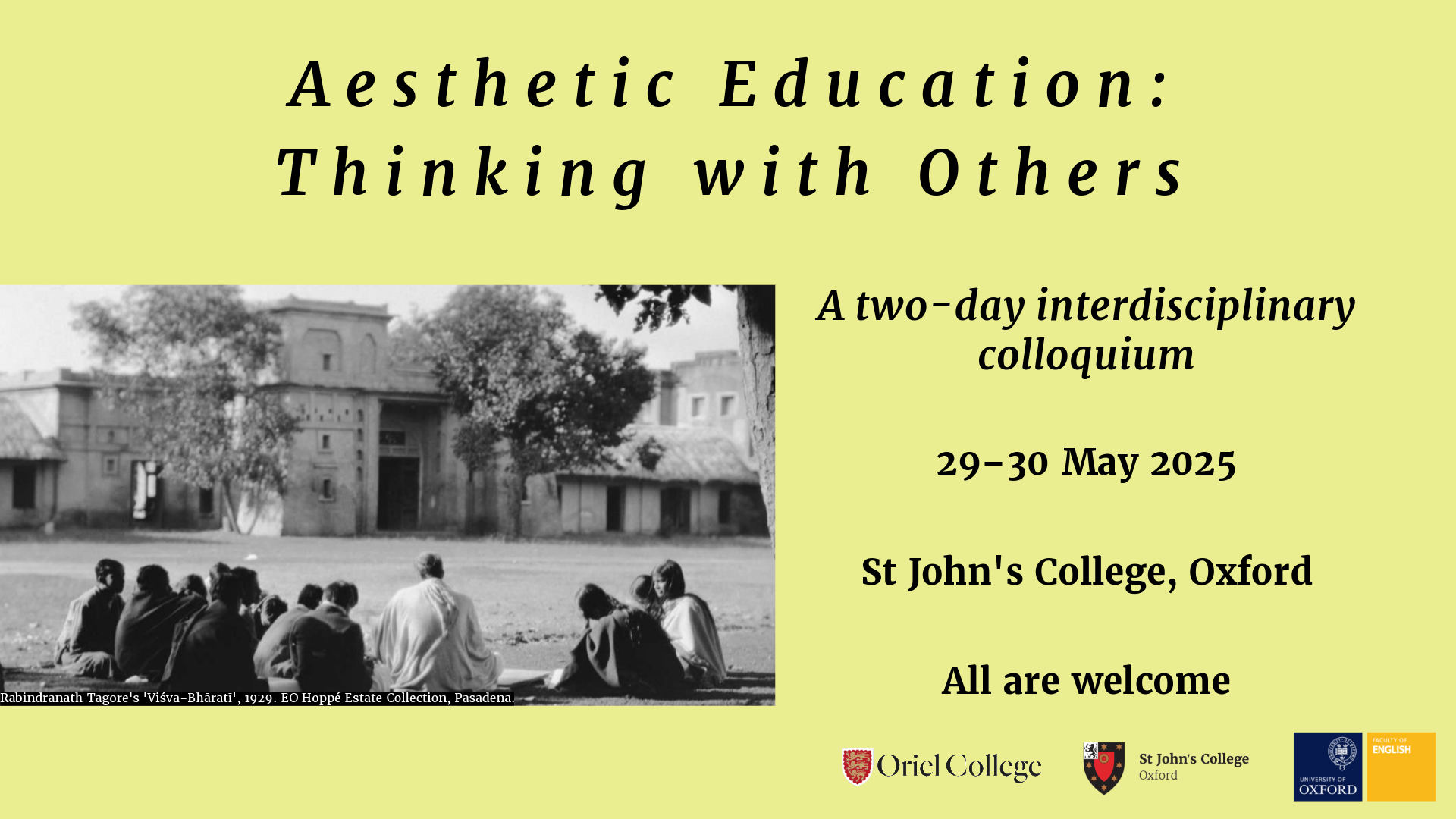Aesthetic Education: Thinking With Others
- Date 29 May 2025 - 30 May 2025
- Location St John's College, Oxford
Aesthetic Education:
The term ‘aesthetic education’ refers to the way in which our ability to perceive, imagine and judge is importantly shaped by our responses to works of art and (albeit now less frequently) experiences arising from our encounter with the natural world. The attempt to define how it works and why it matters has a long history, which extends from Plato’s Republic through Kant’s Critique of Judgment (1791), Schiller’s Letters on the Aesthetic Education of Man (1795), Matthew Arnold’s Culture and Anarchy (1869), Tagore’s Viśva Sāhitya (1907) and Herbert Marcuse’s The Aesthetic Dimension (1977). This tradition of inquiry, both within Europe and beyond, has fascinatingly explored the role of literature and the arts in shaping moral understanding and promoting a good society. But following a series of influential interventions (about which click here for more detail), there is now a certain lack of confidence, or even suspicion, about what it means to appeal to this tradition for intellectual guidance, or indeed for support in justifying our own role as educators.

The colloquium:
This colloquium aims to generate dialogue between scholars with different areas of expertise—from English and modern languages, philosophy, political theory, and sociology—on the subject of aesthetic education. More precisely, we will consider how best to go about placing ourselves in a productive dialogue with the many-sided inheritance of the past. Each speaker has been invited to ‘think with’ a particular historical interlocutor in relation to some aspect of aesthetic education, to evaluate what is generative and what is untenable in that approach.
On the first day (Thursday 29 May) the main speakers will present short versions of their papers in a series of panels, followed by Q&A. On the following day (Friday 30 May) there will be a round-table event in the morning in which four respondents will comment in detail on the papers, again opening out to wider discussion involving the audience.
All are welcome to attend. Refreshments will be provided.
Programme details:
Thursday 29 May
Location: St John’s Auditorium in Garden Quad (access the College through the main lodge)
9.15: Welcome and introductions
9.30—10.45: Panel One
- Amit Chaudhuri (novelist, musician and literary critic), ‘The Emergence of the Impersonal.'
- Lloyd Pratt (University of Oxford), ‘Black Aesthetic Education and Self-Reliance.’
- Linda Zerilli (University of Chicago), ‘The Aesthetics of Democratic Persuasion: Thinking with Arendt, Kant, and Wittgenstein.’
10.45—11.15: tea & coffee available in the Garden Quad reception room
11.15-12.30: Panel Two
- Erik Bachman (UC Santa Cruz), “The Sense for Art: The Specificity of the Aesthetic, Signal System 1’, and Aesthetics as Comportment”
- Jennifer Gosetti-Ferencei (Johns Hopkins), ‘Literature, Aesthetic Education, and Ecological Thinking.’
- Tim Mehigan (University of Queensland), ‘Ethics for the “Children of the House”: Schiller’s Dispute with Kant in the Letters on the Aesthetic Education of Humanity.’
12.30—14.00: Break
14:00—15.15: Panel Three
- Damian Maher (University of Oxford), ‘A Whale of a Time: Christopher Bollas on Transformational Aesthetic Experience.’
- Gisèle Sapiro (École des Hautes Études en Sciences Sociales), ‘A social critique of aesthetic education: from Bourdieu’s reading of Kant to contemporary challenges.’
- Abigail Zitin (Rutgers), ‘‘You had to be there’: Frances Ferguson’s Kantian Sublime.’
15.15—15.45: tea & coffee available in the Garden Quad reception room
15.45—17.00: Panel Four
- Rosinka Chaudhuri (Centre for Studies in Social Sciences, Calcutta), ‘Aesthetic Education in Schiller and Tagore: Thought and Practice'
- Peter McDonald (University of Oxford), ‘The A-Word, Reading with Wittgenstein and Joyce'
- Yi-Ping Ong (Johns Hopkins), ‘On Imagining the Impossible'.
Friday 30 May
Location: St John’s Auditorium, in Garden Quad
10.00—10:30: tea & coffee available in the Garden Quad reception room
10:30—12.30: Thinking with Others: Responses and Discussion
William Ghosh, Marina McKay, Stephen Mulhall, and Helen Small will each respond to a selection of the papers, followed by questions from the audience.
One can read the abstracts for all the papers listed above here.
Registration:
This colloquium is free to attend, but registration is essential. Click this link before 26 May to reserve your place via Eventbrite.
Please contact the convenors, Patrick Hayes and Nicholas Gaskill, if you have any questions about the event.